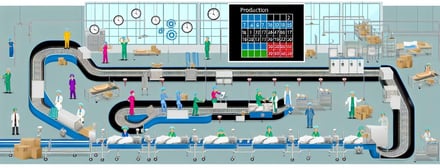Production Scheduling Reliability
In the intricate ecosystem of medical manufacturing, where precision and timeliness are essential, optimizing production scheduling reliability stands as a cornerstone for success. With the demand for medical supplies constantly on the rise, maintaining an efficient production schedule is not just advantageous but imperative.
In this blog, we look into the strategies, tools, and technologies that Supply Chain Managers can leverage to enhance production scheduling reliability, with a focus on integration between PlanetTogether and leading ERP, SCM, and MES systems like SAP, Oracle, Microsoft, Kinaxis, and Aveva.

The Importance of Production Scheduling Reliability
Production scheduling reliability refers to the ability to consistently meet production targets while minimizing downtime, bottlenecks, and disruptions. In the medical manufacturing sector, where even minor delays can have significant consequences, achieving reliability in production scheduling is crucial for ensuring product availability, meeting regulatory requirements, and satisfying customer demand.

Challenges in Achieving Production Scheduling Reliability
Supply Chain Managers face many challenges when striving to optimize production scheduling reliability:
- Complexity of Operations: Medical manufacturing involves intricate processes with multiple interdependencies, making it challenging to create accurate production schedules.
- Variable Demand: Fluctuating demand patterns, especially during healthcare crises or seasonal peaks, pose challenges in maintaining optimal production schedules.
- Resource Constraints: Limited availability of resources such as raw materials, equipment, and skilled labor can hinder production efficiency.
- Regulatory Compliance: Strict regulatory requirements in the medical sector necessitate adherence to specific production timelines and quality standards, adding another layer of complexity to scheduling.
- Supply Chain Disruptions: External factors such as supplier delays, transportation issues, and geopolitical events can disrupt supply chains, affecting production schedules.

Strategies for Optimizing Production Scheduling Reliability
To address these challenges and enhance production scheduling reliability, Supply Chain Managers can implement the following strategies:
- Data-Driven Decision Making: Leverage advanced analytics and data-driven insights to forecast demand accurately, identify production bottlenecks, and optimize resource allocation.
- Real-Time Monitoring: Implement real-time monitoring systems to track production progress, identify deviations from the schedule, and take proactive measures to mitigate risks.
- Capacity Planning: Conduct comprehensive capacity planning to ensure that production schedules align with available resources and production capacity.
- Collaborative Planning: Foster collaboration between different departments, including production, procurement, and logistics, to ensure alignment of goals and priorities.
- Continuous Improvement: Adopt a culture of continuous improvement by regularly reviewing and refining production processes, leveraging techniques such as Lean manufacturing and Six Sigma.
- Automation and Robotics: Invest in automation and robotics technologies to streamline production processes, minimize manual interventions, and improve scheduling accuracy.
- Integration of Scheduling Software: Integrate advanced scheduling software such as PlanetTogether with ERP, SCM, and MES systems to achieve seamless data flow, synchronization of processes, and enhanced decision-making capabilities.

Integration between PlanetTogether and ERP, SCM, and MES Systems
One of the key components of optimizing production scheduling reliability is the integration of scheduling software with existing ERP, SCM, and MES systems. By integrating PlanetTogether with systems such as SAP, Oracle, Microsoft, Kinaxis, and Aveva, Supply Chain Managers can unlock several benefits:
- Data Consistency: Integration ensures that relevant data, including production orders, inventory levels, and resource availability, is synchronized across different systems, eliminating discrepancies and improving data accuracy.
- Real-Time Visibility: Supply Chain Managers gain real-time visibility into production schedules, resource utilization, and order status, enabling them to make informed decisions and respond quickly to changes.
- Streamlined Processes: Integration streamlines processes by eliminating manual data entry and facilitating automated communication between systems, reducing errors and improving overall efficiency.
- Enhanced Decision Making: By accessing consolidated and up-to-date data from multiple systems, Supply Chain Managers can make more informed decisions regarding production planning, resource allocation, and order prioritization.
- Scalability: Integrated systems are scalable, allowing organizations to adapt to changing business needs, accommodate growth, and expand operations seamlessly.
In the highly regulated environment of medical manufacturing, optimizing production scheduling reliability is essential for meeting customer demand, ensuring product quality, and maintaining competitive advantage.
By implementing strategies such as data-driven decision making, real-time monitoring, and collaborative planning, coupled with the integration of advanced scheduling software like PlanetTogether with ERP, SCM, and MES systems, Supply Chain Managers can enhance production scheduling reliability, drive operational excellence, and navigate the complexities of the medical manufacturing landscape with confidence.
By embracing innovation, leveraging technology, and fostering collaboration across the supply chain, medical manufacturing facilities can achieve new heights of efficiency, resilience, and customer satisfaction in their quest to optimize production scheduling reliability.
Are you ready to take your manufacturing operations to the next level? Contact us today to learn more about how PlanetTogether can help you achieve your goals and drive success in your industry.